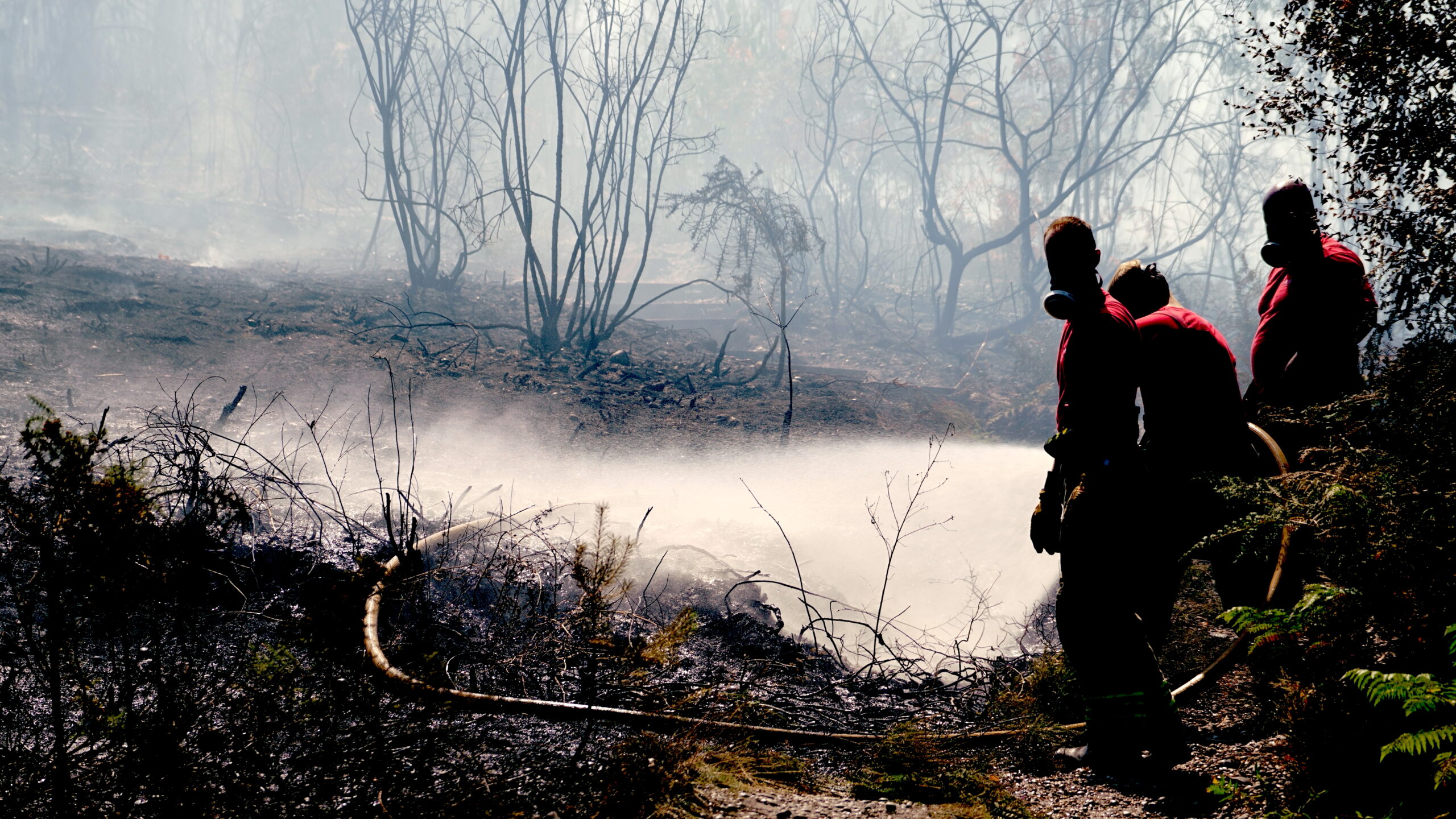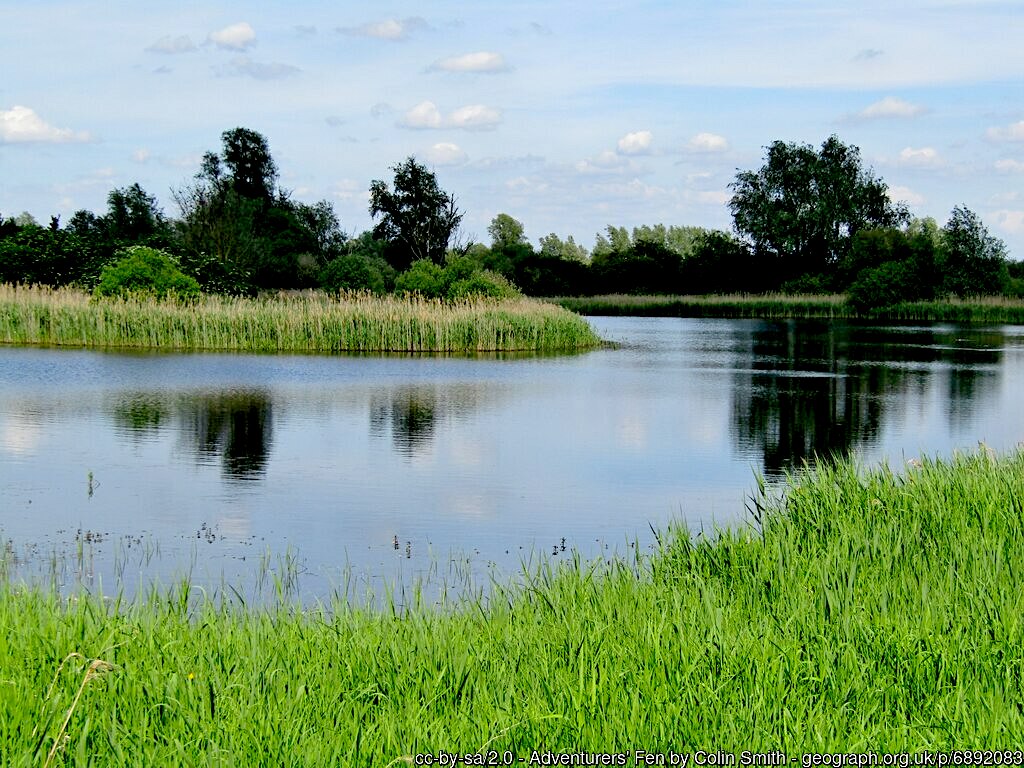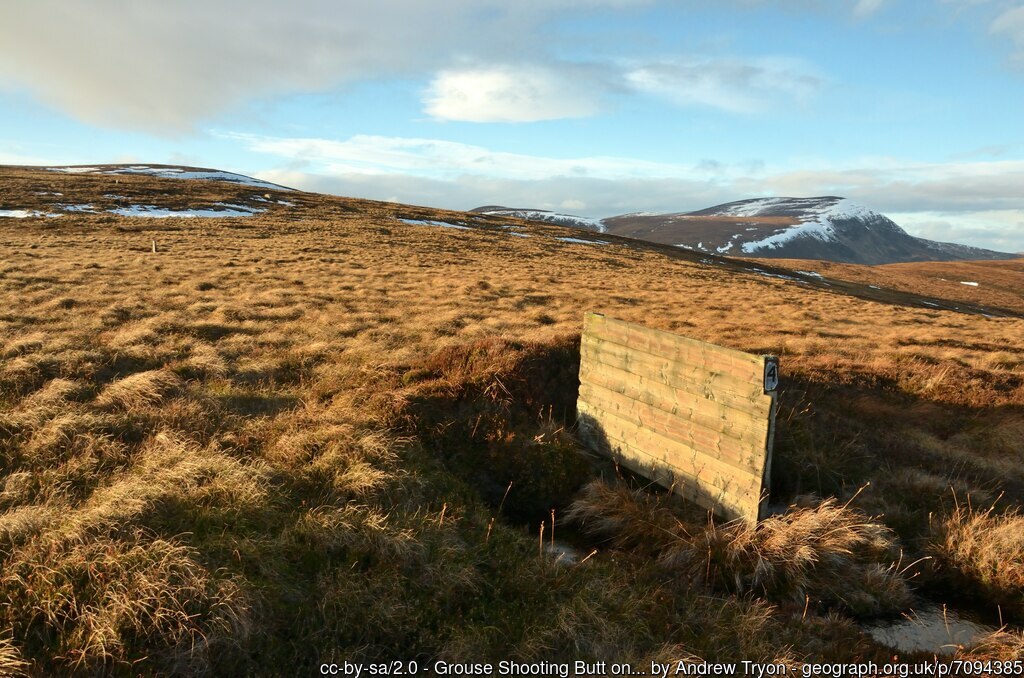Adam Ramsay says rural land in the U.K. is privately owned, publicly funded and run largely for the rich, in ways that worsen climate breakdown.

On July 19, the hottest day on record in the U.K., fire fighters had to tackle a major fire on Shirley Hills, near Croydon in Great Britain. (Peter Trimming, CC BY-SA 2.0, Wikimedia Commons)
By Adam Ramsay
openDemocracy
 As climate breakdown increases, the cycle of droughts and floods in the U.K. will intensify. We’ve seen in recent weeks the devastation that this can cause. The stats are terrifying: half of England’s potato crop is expected to fail this year. Even drought-tolerant maize — which is only grown in the south of England because the rest of the U.K. is too cold and wet — is struggling in the heat.
As climate breakdown increases, the cycle of droughts and floods in the U.K. will intensify. We’ve seen in recent weeks the devastation that this can cause. The stats are terrifying: half of England’s potato crop is expected to fail this year. Even drought-tolerant maize — which is only grown in the south of England because the rest of the U.K. is too cold and wet — is struggling in the heat.
People are suffering now, so short-term solutions are needed. With both food and fuel prices spiraling, it will be a grim winter, so medium-term planning is required too. But, of course, we need a long-term strategy.
Changes to Britain’s climate are now inevitable. And that doesn’t just mean that England’s pastures green will turn into French wine country, as too many news producers like to imagine. More carbon in the atmosphere means increased energy in our weather systems. That means greater intensity as well as more warmth — not so much the calm balm of the historic south of France as cycles of climate chaos.
Although we must do what we can to avoid pumping more energy into that system (by eliminating carbon-based energy), we also have to accept and adapt to what is coming: cycles of dry and wet, driving natural disasters of a kind our islands aren’t accustomed to.
Much of that adaptation means rethinking our land use. At the moment, water falling on to higher ground often lands on barren moors, overgrazed by sheep or burned for grouse shooting. Where once there were trees, now any stems that break through the soil are munched by an ungulate or fried in a fire.
Where once rain gathered in upland wetlands and was absorbed and transpired by forests, now it is channeled in ditches like some unwanted pest and rushed downhill. Other than small streams siphoned off for reservoirs or irrigation, most of this water is sent down to the sea.
When there is more water than normal, banks burst and those homes that have inconveniently placed themselves down the slope from upland landowners are flooded. By the time the weather is dry again, the water has disappeared.
Wetlands are to temperate zones what rainforests are to the tropics. They are nature’s sponges, absorbing and releasing water, and regulating its flow. But after centuries of drainage, England has only about 10 percent of the marshes and fens that protected it from extremes of weather a thousand years ago. Now, with climate change, it needs those wetlands more than ever.

Adventurers’ Fen, an area of dry and wet grassland, reedbed and pools near Wicken, Cambridgeshire, Great Britain. (Colin Smith, CC BY-SA 2.0)
Of course, there are some specific solutions: my parents were some of the first people to bring beavers back to the U.K. — for which they deserve a shout-out. Beavers are nature’s engineers, rebuilding riparian ecosystems at a fraction of the cost of a man with a tractor.
Burning heather must be banned. An absurd act of vandalism at the best of times, destroying whole swathes of moor to pander to a hobby of the mega-rich is completely unjustifiable now that those moors are needed in the struggle for climate change adaptation. While we’re at it, let’s ban driven grouse-shooting entirely.
But at its core, the problem is that vast swathes of the U.K. countryside are still owned by a tiny number of people, who manage them in the interests and traditions of their kin. A third of England and Wales is still owned by the ancient aristocracy. Scotland has the most centralised land ownership pattern in Europe — arguably in the Western world. An astonishing 8 percent of British land is managed as grouse moor.

Grouse shooting butt on Cnoc na h-lolaire, Sutherland, near Highland, Great Britain. (Andrew Tryon, CC BY-SA 2.0)
The nations that make up the U.K. consist of people and the land they live on, and unimaginable portions of the latter are still controlled by tiny numbers of people, for the simple reason that their ancestors have owned them for generations.
Having been “decimated” by cuts, fire services must risk personal safety as climate change worsens heatwaves
For the past 60 years, this ownership pattern has been maintained because the E.U.’s common agricultural policy (CAP), launched in 1962, was designed for French farmers, with their much smaller parcels of land, and failed to properly consider the absurdities of British ownership patterns.
The result was that taxpayers were — still are — paying to be flooded and desiccated by wealthy aristocrats. Our rural land is privately owned, publicly funded and run largely for the rich.
Now that Brexit is supposedly “done,” reform is, theoretically, possible and the various governments of the nations of the U.K. are investigating what to replace CAP with.
This summer’s droughts should be a reminder that radical change is needed.
We could stop subsidising big landlords and fund community buyouts instead. We could stop paying millions to prop up otherwise insolvent upland sheep farms and, when those farms go bust, take them into public ownership, rewild our hills and restore our upland wetlands.
England, Wales and Northern Ireland could, as Scotland already does, insist that its people have a right to roam across its land and paddle up its rivers.
Restoring our ecosystems is vital in its own right. But forests, marshes, swamps and fens are nature’s buffers. They wet our brows when the sun beats down and they mop the ground when the rain pours. As we tip from thousands of years of climatic stability into an era of atmospheric chaos, they can help soften the landing. But only if the land is owned by those who let them.
Adam Ramsay is openDemocracy’s special correspondent. You can follow him at @adamramsay. Adam is a member of the Scottish Green Party, sits on the board of Voices for Scotland and advisory committees for the Economic Change Unit and the journal Soundings.
This article is from openDemocracy.
The views expressed are solely those of the author and may or may not reflect those of Consortium News.

Nothing much changes, the populace is duped into thinking that we have a democracy. It is all smoke and mirrors bullsh*t is fed to us by an establishment press and a sycophantic broadcasting system. The sad thing is the population are afraid to take the blue (or is it red) pill and see reality. This land ownership article is the tip of the iceberg when it comes to elite/state control, from the monarchy to private education and the judiciary to the military and the city, the old school tie remains dominant. Nothing will change until these sections of the elitist society are brought to heel, but I’m afraid things will have to get much worse before the ‘ hoi polloi ‘ stand up to be counted, unfortunately by that time the cowardly elitists/leaders will have sunk us into a war to save their own status and the poor will go off waving their patriotic flags to kill and be killed.
Agree and said well.
Crisp but excellent understanding of the elites and their privileged antics.
Does anyone know of ANY politician in the UK, from any of the parties, that a) understands the problem, and b) would have the guts to act on it?
The Green Party are currently propping up the bourgeois nationalist Scottish government, which shows absolutely no signs of tackling the privilege that leaves so much land in the hands of so few people.
They are however enthusiastically engaged in transcultism, introducing free sanitary products, not for women, but for “people who menstruate.”
Lord preserve us from such hippy idiots.
Land ownership in Britain (UK and Ireland) can be traced back to that acquired by ‘Norman Robber Barons’ and more recently to estates acquired from the profits of Slave Trading (Sugar Plantations). The direct relations of these people make up a large majority of the current establishment club. Monarchy, Oxbridge, Sandhurst, Eton/Harrow/etc., and other bodies all represent the educational foundations of Britain’s elites and the foundations of the incompetence, corruption and oppression that permeates modern day Britain.
Nothing will change in Britain until the citizens wake up and realise how they have been literally oppressed for the last thousand years. Celebrations of monarchy, the Military and hero worship of lords, ladies and princesses demonstrate how deeply the indoctrination goes. The same elites are the ones who ‘own’ the grouse moors, have the big houses and farming estates, jet all over the world for holidays and parties and infest the military leadership – the same people have huge carbon footprints and are protected from the affects of their lifestyles by their huge fortunes acquired through force and oppression rather than hard work and ability.
Britain is founded on inequality and unfortunately the majority of people seem to think that’s just fine.
However, …, although this is disastrous for the peoples of the British Isles; on a global scale, Britain has an insignificant impact on the Planet’s health, particularly when compared to the USA, China, India, Europe and Russia. So Britain, don’t worry about the climate, worry about the economy and the inequality.
A good article and an excellent response here that anchors it under a broader perspective. But still the British elites can’t entirely wash their hands off from the ecological mess elsewhere in other countries as many of them were their former colonies whose peoples are still struggling against the policies, programs and elites and their progenies that they left behind. Climate can only be rectified when true and holistic independence is achieved !
I totally agree with you, in fact I more or less wrote the same comment but in a far less articulate way. However, will the citizens sorry subjects of the UK ever stand up ?As you commented we have been ground down for a thousand years, it’ll take a lot to rise up against our leaders, sorry again our masters.
“we need a long-term strategy.”
The world does but not a segmented one.
“War” is never restricted to things that go bang, although the opponents seek to rely on the beliefs of others in such illusions.
The enclosure of the commons was a mistake. It’s time to tear down those walls and fences and reclaim it.
Compulsory sale of private land would almost certainly lead to an increase in private housing development, rather than ecosystem restoration. Improving regulation of land use would be a better alternative. The author does not care for the ‘ancient aristocracy’ but they could be useful allies against the property developers who make substantial contributions to both parties, especially the Conservatives.
Excellent article, Mr. Ramsay! Thank you for your observations and insights. The suggested actions to save and/or restore wetlands, among other natural features long compromised by human activity, and which will hopefully be acted upon by the people of the UK, will be among the most important factors in the attempt to mitigate the worst of the effects of the exacerbated feedback loops in nature now in play all around the Earth. These ideas and suggestions deserve widespread discussion.